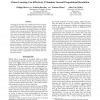Free Online Productivity Tools
i2Speak
i2Symbol
i2OCR
iTex2Img
iWeb2Print
iWeb2Shot
i2Type
iPdf2Split
iPdf2Merge
i2Bopomofo
i2Arabic
i2Style
i2Image
i2PDF
iLatex2Rtf
Sci2ools
131
click to vote
AAAI
2008
2008
Clause Learning Can Effectively P-Simulate General Propositional Resolution
Currently, the most effective complete SAT solvers are based on the DPLL algorithm augmented by clause learning. These solvers can handle many real-world problems from application areas like verification, diagnosis, planning, and design. Without clause learning, however, DPLL loses most of its effectiveness on real world problems. Recently there has been some work on obtaining a deeper understanding of the technique of clause learning. In this paper we utilize the idea of effective p-simulation, which is a new way of comparing clause learning with general resolution and other proof systems. We then show that pool proofs, a previously used characterization of clause learning, can effectively p-simulate general resolution. Furthermore, this result holds even for the more restrictive class of greedy, unit propagating, pool proofs, which more accurately characterize clause learning as it is used in practice. This result is surprising and indicates that clause learning is significantly mor...
| Added | 02 Oct 2010 |
| Updated | 02 Oct 2010 |
| Type | Conference |
| Year | 2008 |
| Where | AAAI |
| Authors | Philipp Hertel, Fahiem Bacchus, Toniann Pitassi, Allen Van Gelder |
Comments (0)

